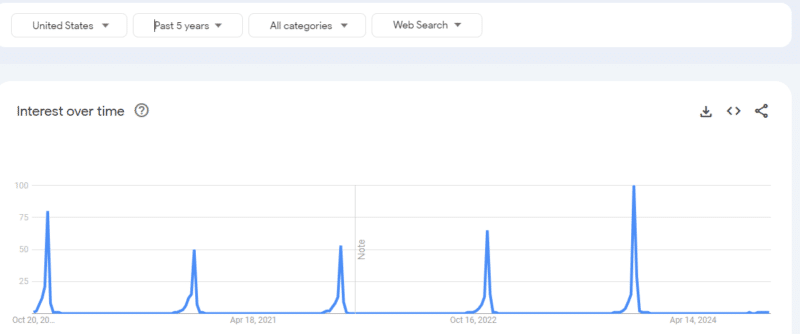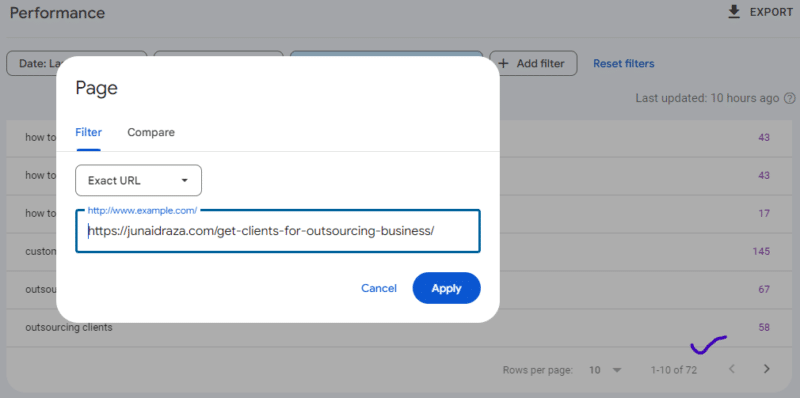Search volume plays an important role in digital marketing, especially in search engine marketing strategies like search engine optimization (SEO) and search engine advertising (SEA).
That’s why understanding search volume is key before search engine marketing.
For example, with a solid understanding of search volume, you can identify and target the right keywords for your SEO campaigns.
By SEO, I’m not just referring to popular search engines (Google) alone. I’m talking about all search engines—Bing, AI-powered search engines, Amazon, YouTube, and any platform that can present your website to potential clients.
Once you grasp the concept of search volume, you’ll have a much better chance of selecting keywords that can maximize your return on effort.
For instance, if you’re fortunate enough to discover a high search volume keyword with strong commercial intent that’s relatively untapped, low competition, or emerging, this single keyword can significantly impact your business’s success.
Therefore, if you’re involved in SEO or SEM, understanding everything related to search volume is worth investing.
In this guide, I’ll walk you through all the essential details to make the concept and its implications crystal clear.
On this page
What is Search Volume?
Search volume refers to the average number of times people search for a specific search phrase, term, or keyword within a particular region for a month.
For example, the search volume for the keyword ‘couches for sale’ in the USA is over 60.5K, according to Semrush.

With relatively low competition (that’s 26%), it presents a great opportunity for businesses in the furniture space, such as an e-commerce store selling couches, to target and potentially rank for this keyword.
Similarly, if you’re a small business consultant, the keyword ‘small business consultant’ has about 1,900 searches per month with manageable competition, making it feasible to rank for.

You can also use tools like Ahrefs for finding search volume data on YouTube, Bing Keyword Research for Bing, and Helium 10 or JungleScout for Amazon keyword research.
By analyzing search volume across various platforms and search engines, you’ll get a more comprehensive view of the demand and industry trends, helping you refine your strategy even further.
What is the Search Volume Trend?
A search volume trend refers to the fluctuations in the search volume of a keyword over a defined period, which can range from a few months to several years, depending on the depth of analysis.
Let’s break it down for better understanding:
If you’re examining the search volume trend over the last two months, you’re essentially comparing the keyword’s search volume in the most recent 30 days with the previous 30 days. This helps you identify short-term shifts in interest or demand.
For a deeper analysis, if you want to see the search volume trend for an entire year, you’re assessing how often people search for that keyword throughout the year. This provides a more comprehensive view of its performance.
Analyzing search volume trends helps determine whether a keyword is seasonal (fluctuating based on specific times of the year) or evergreen (maintaining consistent search interest year-round).
For instance, when we check the search volume trend for the keyword ‘Black Friday deals,’ we see massive spikes in November, with little to no interest or significant volume during the other months.

This clearly identifies it as a seasonal keyword—no matter how high the search volume is during November, it won’t bring any meaningful results in other months.
What is a good keyword Search Volume?
Many beginners wonder what qualifies as a good search volume for a keyword, but there isn’t a one-size-fits-all answer. It largely depends on keyword intent and the industry you’re operating in.
For example, if you’re targeting a high-intent commercial keyword in a high-paying industry, even a search volume of 10 to 100 can be valuable.
Imagine attracting 100 potential clients to your website for your software development services—these visitors could bring far more value than 10,000 pageviews on an informational blog.
The key here is relevance.
If you’re selling expensive products or services, a few hundred searches per month can be incredibly valuable. On the other hand, if you’re targeting a broader audience with lower-priced products, a higher search volume—several thousand searches—might be considered good.
Ultimately, the quality of the traffic (i.e., how well it converts) often matters more than the raw search volume.
Search Volume vs. Traffic
When you target a specific term, you often attract traffic not only from that term but also from various relevant search terms. This can significantly increase your overall traffic, making it much higher than just the number associated with the primary keyword.
For example, if you focus on the keyword “keyword search volume,” you may also receive traffic from several related terms, such as:
- Search term volume
- Search phrase volume
- Keyword search metrics
As a result, the cumulative traffic from these relevant searches will exceed the traffic generated by the primary keyword alone.
Understanding this relationship between search volume and traffic is crucial for optimizing your content strategy and maximizing your website’s visibility.
Here is a practical example:
I wrote a guide on how to get outsourcing clients on my personal brand. And that guide appears for 72 keywords on Google alone.

Thus, the traffic will depend on optimization and the quality of content.
How to find the search volume?
First, be clear about which search engine you want to analyze the search volume for. For example, if you’re looking for search volume on Google, Bing, YouTube, etc., we’ve discussed best practices for these platforms.
However, if you’re interested in finding the search volume of keywords for e-commerce platforms like Amazon, you’ll need specialized e-commerce tools.
For instance, to find the search volume for Amazon keywords, here’s what you should do:
- Go to the Helium 10 website and sign up for an account. They offer various pricing plans, including a free trial with limited features.
- Once you log in, you’ll be directed to the Helium 10 dashboard, where you can access various tools for keyword research, product research, and more.
- Navigate to the Cerebro tool, which is designed for reverse ASIN lookups. Enter the ASIN (Amazon Standard Identification Number) of a competitor’s product or your own.
- Click “Search.” Cerebro will provide a detailed report, including keywords that the product ranks for, their estimated search volume, and the keyword’s rank.
What is a low search volume?
Generally, a keyword with 10 to 100 searches is considered to have a low search volume. However, it’s important to recognize that a low search volume keyword can sometimes be far more valuable than a high search volume one.
For instance, in high-paying industries, a keyword with a low search volume might target a highly specific audience with strong commercial intent. This means that even a few searches could translate into high-quality leads or conversions.
What is a medium search volume?
Generally, a medium search volume is considered to be between 1,000 to 10,000 searches per month.
If you’re working on an informational project and your website has established some authority, targeting medium search volume keywords should be a strategic choice.
These keywords typically have enough search interest to drive significant traffic to your site, while still being feasible to rank for, especially if your content is well-optimized and relevant to your audience.
What is a high search volume?
Generally, a high search volume is considered to be between 10,000 to 100,000 searches per month.
Targeting high search volume keywords can significantly boost your website’s visibility and attract a large audience. However, it’s essential to keep in mind that these keywords often come with increased competition, making them more challenging to rank for.
What does zero search volume mean?
When you encounter a keyword with zero search volume in various tools, it doesn’t necessarily indicate that the actual search volume is truly zero. Many keyword research tools may not update their databases frequently, or the topic has just started emerging, this tool’s 0 search volume won’t be accurate.
If you believe a keyword has potential but shows zero volume according to these tools, don’t dismiss it outright. It may still attract traffic or serve a specific audience segment effectively.
Thus, while dealing with search volumes, it’s crucial to consider the context, such as industry trends and user intent, rather than relying solely on numerical data.